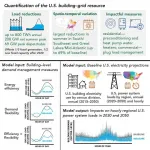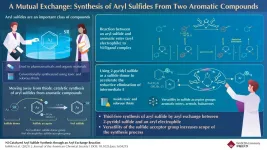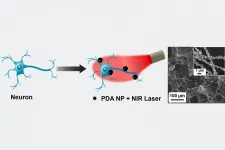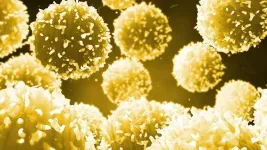Effectiveness of mRNA vaccines against the Alpha and Beta variants in France
ComCor study: analysis of the effectiveness of messenger RNA vaccines against the SARS-CoV-2 Alpha and Beta variants in France
2021-07-21
(Press-News.org) Over the past six months, the World Health Organization has categorized four SARS-CoV-2 variants as being "of concern" because they are more transmissible or may escape the immune response. They have been termed the Alpha, Beta, Gamma and Delta variants. Scientists from the Institut Pasteur, in collaboration with the French National Health Insurance Fund (CNAM), Ipsos and Santé publique France, conducted a nationwide case-control study to evaluate the effectiveness of mRNA vaccines against symptomatic forms of SARS-CoV-2 infection, be that non-variant virus or the Alpha and Beta variants. The results show that the two-dose vaccination regimen of mRNA vaccines provides 88% protection against non-variant virus, 86% against the Alpha variant and 77% against the Beta variant. The results of this study were published in The Lancet Regional Health Europe on July 14, 2021.
In late 2020, two new variants of SARS-CoV-2 were reported in the United Kingdom and in South Africa, respectively. This occurred at a time when the United Kingdom was experiencing a resurgence in the incidence of SARS-CoV-2 infections. This was later attributed to the emergence of the Alpha variant, which has now demonstrated increased transmissibility as compared to the original SARS-CoV-2. The Beta variant was first reported in South Africa and later identified to carry a mutation known as E484K and which is associated with immune evasion. The reporting of the first SARS-CoV-2 variants occurred as mass COVID-19 vaccination campaigns were commencing at global level. In France, both Alpha and Beta were circulating in the first months of 2021. It was therefore important to analyze the effectiveness of the messenger RNA (mRNA) COVID-19 vaccines against these SARS-CoV-2 variants of concern.
In October 2020, the Institut Pasteur, in collaboration with the French National Health Insurance Fund (CNAM), Ipsos and Santé publique France, launched the ComCor study, a case-control study at national level to analyze the sociodemographic, behavioral and practical factors associated with SARS-CoV-2 infection. All those infected with SARS-CoV-2 were invited to take part in the study by the CNAM, while non-infected control were identified through an Ipsos representative panel. The first results of the study were published in The Lancet Regional Health on June 7, 2021 (press release here).
In February 2021, the scientists adapted the ComCor questionnaire to add information about vaccination against COVID-19, previous SARS-CoV-2 infection and information on the variants responsible for infection, provided as part of test results. This information was used to assess the effectiveness of two doses of mRNA vaccine against the Alpha and Beta variants, and to evaluate the protection conferred by previous SARS-CoV-2 infection.
In this study, 7,288 people infected with the original strain, 31,313 people infected with the Alpha variant, 2,550 people infected with the Beta variant and 3,644 non-infected controls were included between February and May 2021. The study enabled the scientists to demonstrate that two doses of mRNA vaccine conferred 88% (81-92) effectiveness against infection with original virus, 86% (81-90) effectiveness against infection with the Alpha variant and 77% (71-90) effectiveness against infection with the Beta variant, as measured seven days after the second dose. No difference in vaccine effectiveness was found between different categories of age, sex or occupational exposure.
"There was much expectation surrounding the (vaccine effectiveness) results for the Beta variant, known for its E484K mutation associated with immune evasion. Our estimate of 77% protection is very close to the estimate of 75% reached by the only other study worldwide to have evaluated the effectiveness of mRNA vaccines against this variant. These analyses confirm the effectiveness of the COVID-19 vaccines and the key role that they have to play in tackling the epidemic," explains Arnaud Fontanet, Head of the Epidemiology of Emerging Diseases Unit at the Institut Pasteur and Professor at the Conservatoire National des Arts et Métiers (CNAM).
Another important finding of the study related to previous SARS-CoV-2 infection. The scientists demonstrated that recent infection (in the past 2 to 6 months) confers similar protection to that observed with mRNA vaccines.
The analyses will now be extended to estimate vaccine effectiveness against the Delta variant, which has been the dominant variant in France since early July 2021.
The ComCor project is funded by REACTing, the Fondation de France via the "All United Against Coronavirus" alliance, and the Institut Pasteur. It was recently awarded the CAPNET "national research priority" label.
INFORMATION:
ELSE PRESS RELEASES FROM THIS DATE:
2021-07-21
Tsukuba, Japan - Rice is the world's most commonly grown and consumed crop. It also supports lives and livelihoods, especially in low- and middle-income regions. As such, methods for securing abundant and profitable rice harvests are key in global food security.
The System of Rice Intensification (SRI) offers a repeatable, sustainable system for increasing rice yields. It brings together fundamental planting and harvesting techniques such as strategically spacing plants, minimizing water, and transplanting seedlings. These practices can be repeated in varying conditions. While SRI has been around since ...
2021-07-21
Since buildings consume 75% of electricity in the U.S., they offer great potential for saving energy and reducing the demands on our rapidly changing electric grid. But how much, where, and through which strategies could better management of building energy use actually impact the electricity system?
A comprehensive new study led by researchers from the Department of Energy's Lawrence Berkeley National Laboratory (Berkeley Lab) answers these questions, quantifying what can be done to make buildings more energy efficient and flexible in granular detail by both time (including time of day and year) and space (looking at regions across the U.S.). The research team, which also included scientists from the National Renewable Energy Laboratory (NREL), found that ...
2021-07-21
Aryl sulfide, an aromatic compound in which sulfur is attached to an aryl (a functional group derived from an aromatic ring), is found in biologically active materials effective against asthma, Alzheimer's disease, and cancer. As a result, chemists have shown a lot of interest in synthesizing aryl sulfides. Traditionally, carbon-sulfur (C-S) bond formation reactions between thiols and aryl electrophiles catalyzed by transition metals have been employed for aryl sulfide synthesis because of their high reliability. However, thiols have an unpleasant smell and are toxic. Could there be a way to synthesize aryl sulfides that avoids the ...
2021-07-21
A new study of almost 12,000 Australians has found one-third of the adult population has experienced pure cybercrime during their lifetime, with 14% reporting this disruption to network systems in the past 12 months.
With all forms of cybercrime already costing trillions every year globally, experts from the Australian Institute of Criminology (AIC) and Flinders University say the crimes involved substantial levels of personal victimisation including direct losses as well as the high cost of preventing future attacks.
A pre-COVID-19 snapshot of the cost of 'pure cybercrime' in 2019 has found an approximate ...
2021-07-21
Nanomaterials have been used in a variety of emerging applications, such as in targeted pharmaceuticals or to bolster other materials and products such as sensors and energy harvesting and storage devices. A team in the McKelvey School of Engineering at Washington University in St. Louis is using nanoparticles as heaters to manipulate the electrical activity of neurons in the brain and of cardiomyocytes in the heart.
The findings, published July 3, 2021, in Advanced Materials, have the potential to be translated to other types of excitable cells and serve as a valuable tool in nano-neuroengineering.
Srikanth Singamaneni, a materials scientist, and Barani Raman, a biomedical engineer, and their teams collaborated to develop a noninvasive technology that inhibits the electrical ...
2021-07-21
It's hard to save what you can't identify. That's been a problem for the endangered salt marsh harvest mouse, which is found only in the salty, brackish waters of the San Francisco Bay area. The mouse competes for space with about eight million humans, and more than three-quarters of its habitat has been eaten by development and land conversion. That loss is expected to increase amid rising sea levels.
Conserving the population has proven tricky, in part because it looks so much like another mouse in the area--the western harvest mouse--that is abundant throughout western U.S.
But scientists from UC Davis have developed a tool, a "decision ...
2021-07-21
Researchers from the Antimicrobial Resistance (AMR) Interdisciplinary Research Group (IRG) at Singapore-MIT Alliance for Research and Technology (SMART), MIT's research enterprise in Singapore, alongside collaborators from Biobot Analytics, Nanyang Technological University (NTU) and Massachusetts Institute of Technology (MIT), have successfully developed an innovative, open-source molecular detection method that is able to detect and quantify the B.1.1.7 (Alpha) variant of SARS-CoV-2. The breakthrough paves the way for rapid, inexpensive surveillance of other SARS-CoV-2 variants in wastewater.
As the world continues to battle and contain COVID-19, the recent identification of SARS-CoV-2 variants with higher transmissibility and increased severity has made the development ...
2021-07-21
COLUMBUS, Ohio - The parasites that cause severe malaria are well-known for the sinister ways they infect humans, but new research may lead to drugs that could block one of their most reliable weapons: interference with the immune response.
In the study, scientists defined the atomic-level architecture of the connection between a protein on the surface of a parasite-infected red blood cell when it binds to a receptor on the surface of an immune cell.
When that protein-receptor connection is made under normal circumstances, the infected red blood cell, hijacked by the disease-causing parasite, de-activates the immune cell - meaning the body won't fight the infection. A drug designed to fit into that space could block the interaction, allowing the immune system to get to work clearing ...
2021-07-21
LA JOLLA, CA--You can't make a banana split without bananas. And you can't generate stable regulatory T cells without Vitamin C or enzymes called TET proteins, it appears.
Regulatory T cells (Tregs) help control inflammation and autoimmunity in the body. Tregs are so important, in fact, that scientists are working to generate stable induced Tregs (iTregs) in vitro for use as treatments for autoimmune diseases as well as rejection to transplanted organs. Unfortunately, it has proven difficult to find the right molecular ingredients to induce stable iTregs.
Now scientists at La Jolla Institute for Immunology ...
2021-07-21
DALLAS, July 21, 2021 -- Babies who were breastfed, even for a few days, had lower blood pressure as toddlers and these differences in blood pressure may translate into improved heart and vascular health as adults, according to new research published today in the Journal of the American Heart Association, an open access journal of the American Heart Association.
Research has found that cardiovascular disease risk factors, including high blood pressure, can start in childhood. Studies have also confirmed breastfeeding is associated with lower cardiovascular disease risk in adulthood. However, the amount and length of time breastfeeding that is needed ...
LAST 30 PRESS RELEASES:
[Press-News.org] Effectiveness of mRNA vaccines against the Alpha and Beta variants in France
ComCor study: analysis of the effectiveness of messenger RNA vaccines against the SARS-CoV-2 Alpha and Beta variants in France






